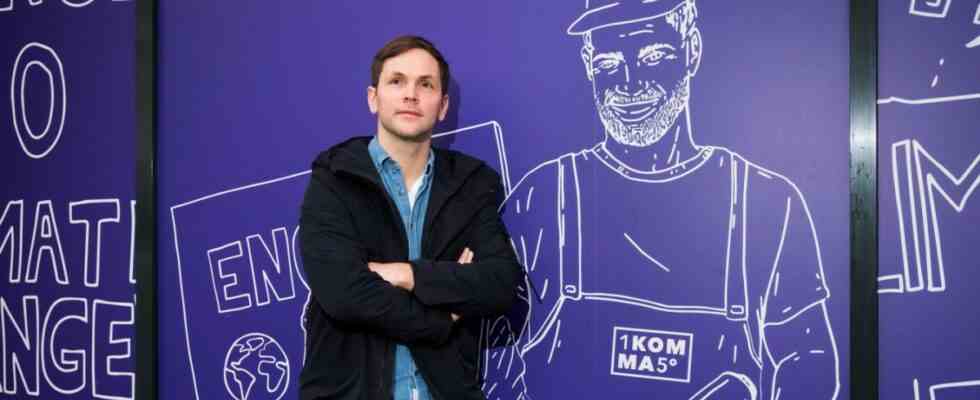Small doesn’t work. Philipp Schröder, 38, always thinks big. He was the first German head of Elon Musk’s e-car company Tesla. And now his own start-up is set to grow. It means 1comma5°, and that says a lot about Schröder’s noble intentions. Founded in Hamburg in July 2021, the start-up wants to help achieve the goal set in the Paris Climate Agreement at the end of 2015 of limiting global warming to 1.5 percent compared to the pre-industrial age. 1Komma5° sees itself in the rapidly growing group of clean techs, these are young companies that want to increase efficiency and productivity with “clean technologies” and services while reducing emissions and conserving resources.
“We are trying to organize the installation on an industrial scale so that it is scalable so that as many buildings as possible become CO₂-neutral as quickly as possible,” says Schröder. Schröder uses the buzz words of the start-up scene in a targeted manner and doesn’t shy away from any standard, no matter how big it may be. “It’s a bit like Amazon in logistics and Ford in the auto industry trying to industrialize processes in their industry for the first time.” In Schröder’s ideal case, buildings would have solar panels on the roof, heat pumps, batteries for storing energy, charging stations for cars and the right electricity tariff. All devices should be networked and controlled via a central computer. He should ensure that electricity is best consumed when the price on the Leipzig electricity exchange is cheap or even negative, because solar and wind parks often deliver in abundance. “We are a licensed energy supplier,” says Schröder.
The central computer that is to be used to control all devices in the building is called Heartbeat.
(Photo: oh)
The calculator that was presented last week already has a name: Heartbeat. The device is a square, flat box, 15 by 15 centimeters in size. The start-up is developing the software itself. In order to network the devices, their manufacturers have to release their interfaces, “some are already doing so,” says Schröder. 1Komma5° has entered into cooperation agreements with some, for example with the US company Enphase for the inverters of the solar system or for storage with the German Shell subsidiary Sonnen, whose managing director Schröder used to be. “If the energy transition is to succeed, storage and intelligent networking are needed to balance out the volatility in the supply of electricity from solar and wind parks,” says Schröder.
Investors include wealthy families
In addition to the digital side, his business has a very analog one. As a holding, 1Komma5° participates in companies in the electrical trade, because someone should install all the systems that are supposed to make buildings more efficient. In return, the old owners receive a stake in the holding company. Schröder does not want to reveal the prices he pays for shares in craft businesses. He is looking for companies with sales of between five and 20 million euros. In order to get away from fossil and nuclear energy sources for the supply of electricity and heat, Schröder estimates the investment costs for a single-family house at 70,000 to 80,000 euros. “Current trades are not in a position to achieve the 1.5-degree target by 2035, and their capacities are not sufficient,” claims Schröder. The market is fragmented.
In Germany, the start-up has invested in Ibeko-Solar, with locations in Munich and Kolbermoor, and in Quadt Energy from Lingen, among others. Schröder puts the number of locations in Germany and Sweden at 16, and the number of employees in the group at around 500, around 50 of them in the holding company. In 2022 Schröder wants to convert more than 200 million euros.
1Komma5° has a cooperation with the Shell subsidiary Sonnen. Among other things, it manufactures batteries for storing renewable energy.
(Photo: oh)
“Sooner or later, all craft businesses will trade under the 1Komma5° brand,” says Schröder. The holding takes over central services, for example in logistics and marketing, in purchasing or in recruiting employees, it coordinates the assignments of the trades at the customer and digitizes the entire process. “We turn bad electricians into good ones,” says Schröder: “We’re optimizing capacities and can therefore offer more cheaply.” In 2030, 1Komma5° wants to make half a million single-family homes climate-neutral, which would mean sales of up to 15 billion euros.
He learned from Elon Musk that it is okay to “unabashedly” live out the unconditional will to perform.
1Komma5° is well received by donors. Investors have invested around 300 million euros in the start-up since it was founded. “In the next round we want to crack the valuation of one billion dollars,” says Schröder. 1Komma5° would then be named for a unicorn, a unicorn, like particularly valuable start-ups in the scene. The sponsors include eCapital, Eurazeo, Porsche Ventures and btov ventures as well as wealthy individuals, including the Haniel, Wacker, Krecke and Jan Klatten families. He himself still holds the majority in the company, says Schröder. He does not rule out an IPO, “perhaps in 2023/24” if it is opportune, because 1Komma5° needs a lot of capital for growth. “I’m a climate economy activist,” says Schröder. “If you want to make a difference, you have to be capital marketable.”
Schröder doesn’t like being asked about Musk all the time, “because the constant questions about personal things are annoying.” But, as Schröder looks on the phone, he seems to have learned a lot from the Tesla boss. He already had the unconditional will to perform, says Schröder, but he’s learned that it’s okay to live it out “unabashedly”. “We see ourselves here as a high-performing team,” says Schröder. It’s like in sports. “I can’t develop a six-pack without sore muscles. Development comes at a price and sometimes causes pain.” Anyone who is not interested in “controlled excessive demands” should please “go to RWE or look for a nine-to-five job. I can explain to people why it’s worth getting up at five.”

